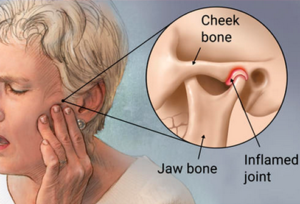Temporomandibular Joint Dysfunction (TMJ / TMD / TMJD)
 The Temporomandibular Joint (TMJ) connects the jaw to the skull. We all have one (actually two, one on each side), but when people complain of their TMJ what they actually suffer from is TMD or temporomandibular joint dysfunction. The TMJ is one of the most use joints in the body. It is necessary for breathing, swallowing, yawning, coughing, eating, drinking, and talking. The TMJ can also have increased stresses placed on it when preforming parafunctional tasks such as tobacco use, chewing on pens, nail biting or simply resting your head on your hand. TMD can be exacerbated by many different tasks preformed throughout the day and a multitude of symptoms can present; below are some of the common symptoms associated with TMD:
The Temporomandibular Joint (TMJ) connects the jaw to the skull. We all have one (actually two, one on each side), but when people complain of their TMJ what they actually suffer from is TMD or temporomandibular joint dysfunction. The TMJ is one of the most use joints in the body. It is necessary for breathing, swallowing, yawning, coughing, eating, drinking, and talking. The TMJ can also have increased stresses placed on it when preforming parafunctional tasks such as tobacco use, chewing on pens, nail biting or simply resting your head on your hand. TMD can be exacerbated by many different tasks preformed throughout the day and a multitude of symptoms can present; below are some of the common symptoms associated with TMD:
- Headaches
- Dizziness
- Ear aches
- Nausea
- Ringing in the ears (tinnitus)
- Muscle pain in the face, jaw, head, neck and shoulders
- Difficulty chewing/eating
- Popping, clicking or grinding in the joint
- In ability to fully open one’s mouth
- Difficulty sleeping (bruxating or grinding teeth at night)
The muscles and joints in the jaw, head, neck and shoulders rely on one another to function most efficiently. Problems in one area can lead to symptoms in another. So how can physical therapy help? By addressing the way that you move and specific limitations in the flexibility and strength in your head, neck and shoulders can reduce or eliminate your jaw pain, headaches and neck and shoulder pain. At Square One Physical Therapy we examine the entire body and develop an individualized treatment plan based on YOUR results that addresses the root of the problem, not just treats the symptoms. We work in conjunction with your dentist or doctor to develop the best treatment plan possible. Call today to schedule your consultation and get back to feeling better.
